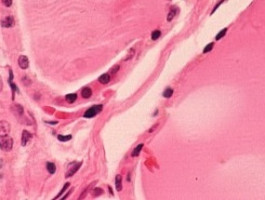
Most immunocompromised people with a blood cancer called multiple myeloma benefited from a third dose of COVID-19 vaccines, a promising sign after it was shown that two doses tended to not be sufficient. However, some people with multiple myeloma still remained vulnerable and may need a fourth dose or antibody treatments as restrictions lift and new variants emerge, according to a fast-tracked study in Cancer Cell.
“This study is the first to comprehensively capture the immune effect of the third dose of the COVID-19 vaccine in patients with plasma cell disorders and blood cancers like multiple myeloma,” said one of the study’s lead authors Samir Parekh, MD, Director of Translational Research in Multiple Myeloma at The Tisch Cancer Institute at Mount Sinai and Professor of Medicine (Hematology and Medical Oncology), and Oncological Sciences, at the Icahn School of Medicine at Mount Sinai. “It provides guidance to myeloma patients, who are at risk for severe infection because they may be immunocompromised due to the disease itself and the cancer treatment.”
Mount Sinai’s previous research had shown that breakthrough infections occurred in multiple myeloma patients due to a poor or complete lack of response to the normal dose regimen of COVID-19 vaccines. The lack of complete protection of these vulnerable patients led to antibody testing and a third vaccine with the hopes that would increase the immune response. This study was important in understanding if the third dose was enough so vulnerable patients definitively knew whether they were protected or needed to continue to follow strict social distancing and masking or seek additional vaccines or treatments when available.
In this latest study, blood samples were collected from 476 patients with plasma cell disorders over a period of 15 months and were compared to samples collected from healthy vaccinated healthcare workers. The findings showed that the third dose significantly increased the level of antibodies in patients with and without prior COVID-19 infection but levels of COVID-fighting antibodies in multiple myeloma patients remained below those observed in healthy people.
Just more than a quarter of multiple myeloma patients had no detectable antibodies after the standard two doses of the vaccine, but in these patients, 88% developed antibodies after a third dose. The third dose also resulted in a significant increase of other immune cells such as T cells B cells, which also help neutralize COVID-19.
After the third dose, neutralization of the wild-type virus increased in multiple myeloma patients in patients who had minimal or no response to the standard two doses. However, neutralizing titers against the Omicron variant was still lower in Myeloma patients as compared to healthy controls. Therefore, a subset of patients may still remain vulnerable to SARS-COV2 infection.
“Our findings underscore the need for continued monitoring of immune responses and further research around measures such as additional vaccine doses or passive immunization for individual multiple myeloma patients that may remain vulnerable after third dose vaccination, especially as COVID-19 restrictions are being lifted worldwide and new waves of viral variants are emerging,” said the study’s other lead author Viviana A. Simon, MD, PhD, Professor of Microbiology, Infectious Diseases and Pathology, Molecular and Cell Based Medicine at the Icahn School of Medicine at Mount Sinai.
Source: Mount Sinai Health System
The World Cancer Declaration recognises that to make major reductions in premature deaths, innovative education and training opportunities for healthcare workers in all disciplines of cancer control need to improve significantly.
ecancer plays a critical part in improving access to education for medical professionals.
Every day we help doctors, nurses, patients and their advocates to further their knowledge and improve the quality of care. Please make a donation to support our ongoing work.
Thank you for your support.